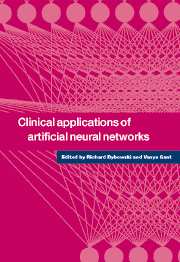Book contents
- Frontmatter
- Contents
- List of contributors
- 1 Introduction
- Part I Applications
- 2 Artificial neural networks in laboratory medicine
- 3 Using artificial neural networks to screen cervical smears: how new technology enhances health care
- 4 Neural network analysis of sleep disorders
- 5 Artificial neural networks for neonatal intensive care
- 6 Artificial neural networks in urology: applications, feature extraction and user implementations
- 7 Artificial neural networks as a tool for whole organism fingerprinting in bacterial taxonomy
- Part II Prospects
- Part III Theory
- Part IV Ethics and clinical prospects
- Index
5 - Artificial neural networks for neonatal intensive care
Published online by Cambridge University Press: 06 October 2009
- Frontmatter
- Contents
- List of contributors
- 1 Introduction
- Part I Applications
- 2 Artificial neural networks in laboratory medicine
- 3 Using artificial neural networks to screen cervical smears: how new technology enhances health care
- 4 Neural network analysis of sleep disorders
- 5 Artificial neural networks for neonatal intensive care
- 6 Artificial neural networks in urology: applications, feature extraction and user implementations
- 7 Artificial neural networks as a tool for whole organism fingerprinting in bacterial taxonomy
- Part II Prospects
- Part III Theory
- Part IV Ethics and clinical prospects
- Index
Summary
Introduction
Neonatal units care for sick newborn babies. Although problems can arise in infants of all gestational ages, the premature infant with immature lung development contributes a significant workload to these units. These babies often require respiratory support, and throughout their clinical course need careful monitoring to detect changes in their respiratory status. In many cases important changes are detected only once there has been a significant deterioration in respiratory status. Earlier detection of these changes will allow intervention to prevent serious deterioration and will improve the outcome for the baby.
The use of artificial neural networks in medicine is increasing, predominantly in the areas of image processing (Farnsworth et al. 1996; Hintz-Madsen et al. 1996) and pattern recognition (Reddy et al. 1992; Reggia 1993). This chapter describes a prototype system developed at Edinburgh to investigate the use of neural networks for the early diagnosis of common physiological conditions found in neonatal infants by using multiple time-series traces that are already stored as part of the current monitoring system.
Results show that, although it may be possible to use neural networks in this domain, substantial work is needed into both the current monitoring processes and the techniques to be used before a system can be developed that will be usable.
Neonatal intensive care
The neonatal unit in Edinburgh uses a computerized monitoring system to collect, display and log physiological data from the dedicated monitors surrounding any incubator (see Figure 5.1).
Information
- Type
- Chapter
- Information
- Clinical Applications of Artificial Neural Networks , pp. 102 - 119Publisher: Cambridge University PressPrint publication year: 2001
